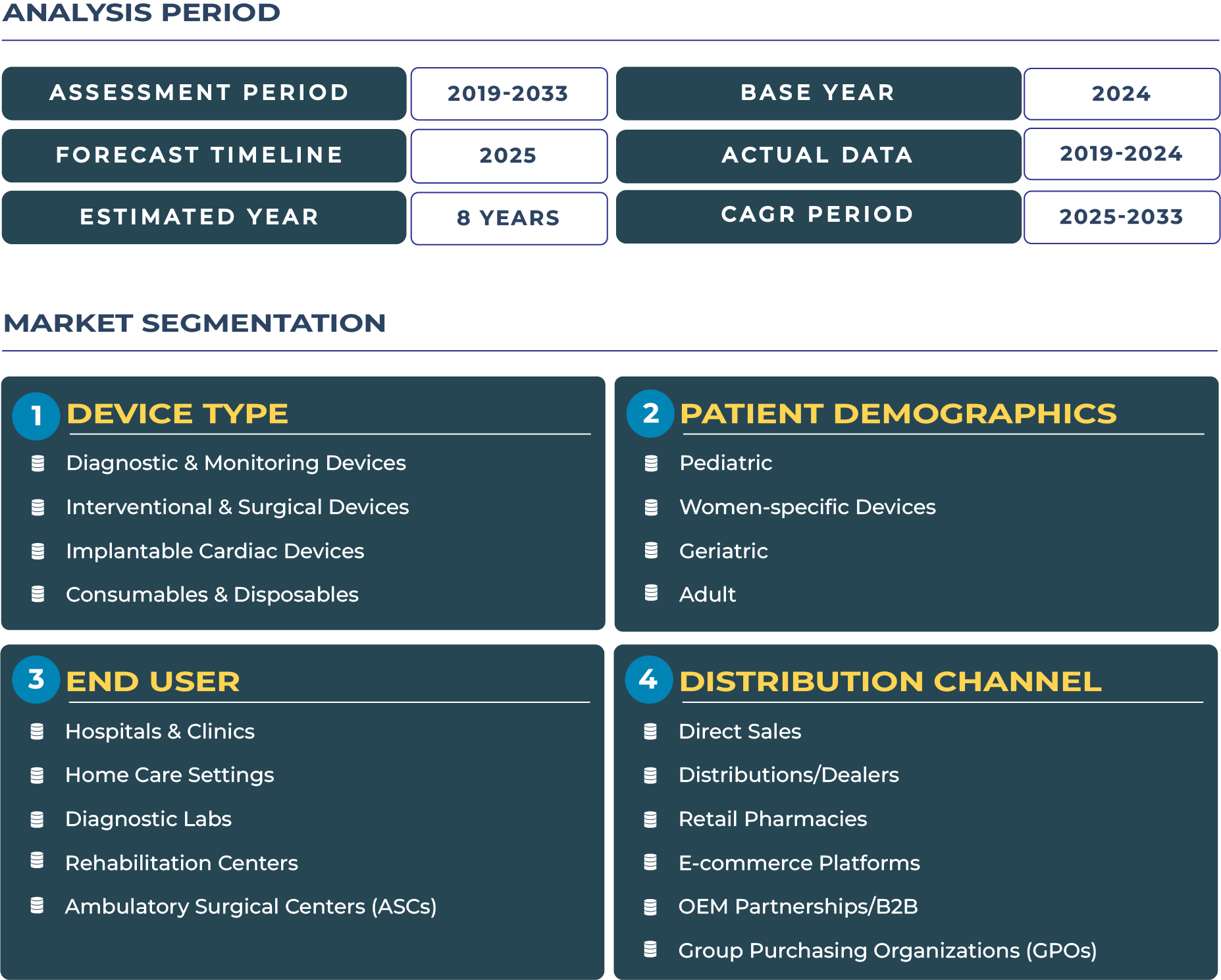Thailand Cardiovascular Devices Market Outlook: Medical Tourism and Private Hospitals Shaping a High-Growth Ecosystem
The Thailand cardiovascular devices sector is on a transformative growth path, benefiting from its medical tourism strengths and premium private hospital network. With a projected CAGR of 14.1% between 2025 and 2033, the market is estimated to grow from USD 316.4 million in 2025 to USD 905.7 million by 2033. This expansion reflects the confluence of global patient inflows, rising demand for implantable cardiac devices, growing adoption of surgical innovations, and digital upgrades across Thailand’s leading healthcare institutions. However, while the ecosystem is primed for expansion, rural-urban disparities and regulatory challenges remain obstacles that stakeholders must address to unlock the market’s full potential.
How Medical Tourism and Private Investments Elevate Thailand’s Cardiovascular Devices Market
Thailand has emerged as one of Asia’s most attractive destinations for advanced cardiac treatment, driven by its flourishing medical tourism sector and extensive private hospital investments. Bangkok, Phuket, and Chiang Mai have become global hubs where international patients seek not only affordable but also premium cardiovascular care. This influx of medical tourists has created a strong demand for advanced implantable cardiac devices, minimally invasive surgical instruments, and state-of-the-art diagnostic technologies. Private hospitals, often competing for global patients, are at the forefront of adopting cutting-edge technologies, ranging from digital heart monitoring systems to AI-assisted imaging diagnostics, to strengthen their reputation as international centers of excellence. With favorable government support for health infrastructure, combined with steady economic stability, Thailand is evolving into a highly lucrative market within the global cardiovascular devices industry.
Drivers & Restraints: Navigating Accelerators and Barriers in Thailand’s Cardiovascular Devices Industry
Medical Tourism and Private Hospitals Driving Demand for Advanced Cardiac Solutions
Thailand’s leadership in the medical tourism sector is a central growth driver for its cardiovascular devices landscape. With internationally accredited hospitals such as Bumrungrad International Hospital attracting patients from the Middle East, Europe, and Asia, the need for sophisticated cardiac devices is escalating. These hospitals adopt implantable pacemakers, advanced stents, and robotic-assisted surgical equipment to cater to international patients who expect world-class care. Furthermore, private healthcare groups continue to invest heavily in digital diagnostic devices and remote monitoring systems, strengthening their role as key buyers in the cardiovascular devices ecosystem. This dynamic has placed Thailand among Asia’s most attractive destinations for cardiovascular device manufacturers seeking high-value segments.
Challenges of Rural-Urban Divide, Cost Sensitivity, and Regulatory Approvals
Despite its premium healthcare hubs, Thailand cardiovascular devices industry faces constraints in rural and semi-urban areas. A majority of rural healthcare facilities continue to rely on basic consumables and lack advanced surgical or diagnostic devices, which widens the healthcare access gap. Price sensitivity among local patients further limits the uptake of implantable devices such as defibrillators and cardiac resynchronization therapy units. In addition, regulatory delays in the approval and import of cardiovascular devices often slow market entry for global players. These barriers collectively restrain the pace of adoption and highlight the importance of targeted rural outreach programs, regulatory streamlining, and public–private partnerships to achieve balanced growth across the country.
Trends & Opportunities: Unlocking Growth Pathways Across Thailand Cardiovascular Devices Sector
Premium Private Hospitals and Telemedicine Enabling Broader Cardiovascular Care
Thailand’s leading urban hospitals are setting benchmarks in cardiovascular care by integrating digital monitoring devices, wearable cardiac sensors, and AI-powered diagnostic platforms into routine practice. Telemedicine programs launched during the pandemic continue to link rural patients with urban cardiologists, creating new demand for portable monitoring systems and consumables such as electrodes and catheters. The expansion of heart-focused specialty centers in Bangkok and Phuket reinforces the trend of technology-led adoption, ensuring that premium cardiovascular devices gain rapid traction among patients with higher spending capacity.
Capitalizing on Medical Tourism Hubs and Public-Private Partnerships
Future opportunities in the Thailand cardiovascular devices market lie in leveraging its global reputation as a medical tourism hub. Strategic partnerships between device companies and private hospitals could enhance technology deployment in cardiology departments catering to international patients. Moreover, collaboration with telecom companies for remote cardiac monitoring bundles could help bridge access gaps across Thailand’s islands and rural communities. With government-backed initiatives to position Thailand as a regional leader in healthcare innovation, device manufacturers have a unique chance to align with national ambitions while tapping into premium patient segments.
Competitive Landscape: Strategic Moves Defining the Thailand Cardiovascular Devices Ecosystem
The Thailand cardiovascular devices market is shaped by a mix of global giants and regional players. Leading multinational companies such as Medtronic and Abbott are actively supplying implantable cardiac devices and interventional technologies to premium hospitals. Simultaneously, local distributors and suppliers are strengthening networks to ensure availability across secondary cities. Recent examples include private hospitals upgrading cardiology departments with robotic-assisted surgical tools in 2024, alongside pilot programs introducing remote cardiac monitoring for medical tourists recovering post-treatment. Strategies such as focusing on tourism-driven hubs, forming partnerships with private hospitals, and piloting telehealth services are becoming dominant competitive differentiators. This dynamic mix highlights how Thailand is becoming not only a destination for cardiac care but also a competitive testing ground for cardiovascular device innovation.







